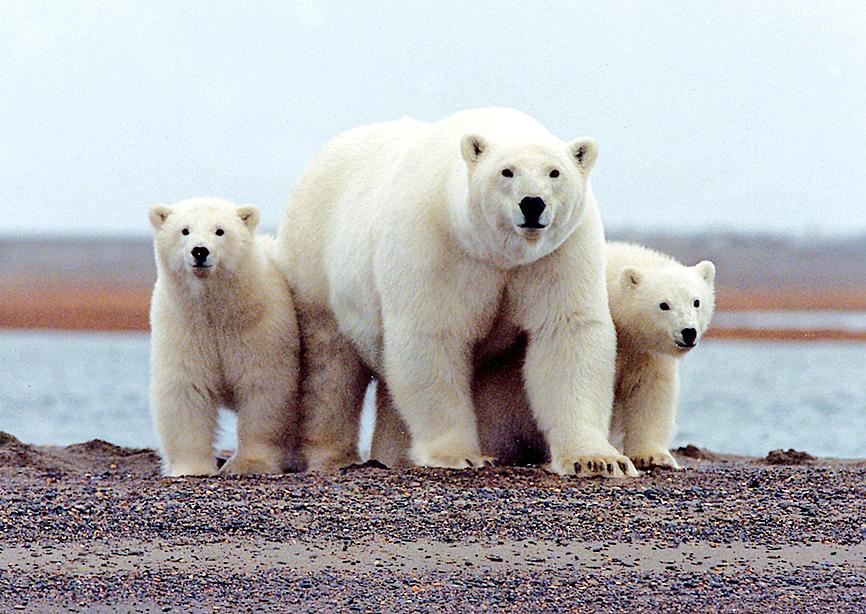Polar bears are increasingly foraging on seabird eggs as climate change shrinks their arctic hunting grounds, but research published yesterday on the phenomenon highlights the struggle the predators have to adapt to their rapidly changing environment.
Dwindling sea ice is cutting short the time they have to hunt seals, their preferred prey.
With a growing imperative to find alternative sustenance, polar bears have been pushed further afield in search of food, including scavenging in areas populated by humans.

Photo: Reuters
Some are also coming ashore at the same time as seabirds are nesting to snack on their eggs.
To measure how efficient the bears were at this foraging — and therefore how useful the eggs are to provide energy in their diets — researchers in Canada used drones to monitor them feeding from common eider duck nests on Mitivik Island in Nunavut.
The study, published in the journal Royal Society Open Science, tracked how the bears approached the nesting site over 11 days as the number of eggs were depleted.
“We found that later-arriving bears increasingly visited more empty nests and did not travel in an energy-minimizing way, but became less picky in the clutches they consumed,” said lead author Patrick Jagielski, of the Great Lakes Institute for Environmental Research at the University of Windsor.
Bears also did not consistently realize that the sudden appearance of a fleeing eider hen meant that eggs were nearby.
“This study demonstrates that, while species are able to incorporate ‘less preferred’ resources into their diet when their primary prey becomes more difficult to obtain, they may not be able to do so efficiently,” the authors wrote.
Jagielski said that the research could not speak more broadly to polar bears’ ability to cope with climate change, but did raise questions about the energy value of eggs as an alternative food source.
There are approximately 25,000 Ursus maritimus left in the wild today in 19 population subgroups distributed across the arctic in Alaska, Canada, Greenland, Norway and Russia.
In July last year, a study published in Nature Climate Change estimated that the species would be starved to extinction by 2100.
Researchers looked at predictions for climate heating and data on the increasing portion of the year that the bears’ must survive on their fat reserves.
Earlier this month, a paper published in the journal Global Change Biology found that polar bears maintained highly specialized diets of soft blubber and flesh for hundreds of years — even during previous periods of arctic warming.
Researchers at Vanderbilt University, who examined dental wear in skulls held in museums, said that polar bears are so specialized in their diets that they might struggle to adapt in a warming arctic.
However, an increase in encounters with grizzly bears could provide one option, as the two species have produced offspring, they said.

Kehinde Sanni spends his days smoothing out dents and repainting scratched bumpers in a modest autobody shop in Lagos. He has never left Nigeria, yet he speaks glowingly of Burkina Faso military leader Ibrahim Traore. “Nigeria needs someone like Ibrahim Traore of Burkina Faso. He is doing well for his country,” Sanni said. His admiration is shaped by a steady stream of viral videos, memes and social media posts — many misleading or outright false — portraying Traore as a fearless reformer who defied Western powers and reclaimed his country’s dignity. The Burkinabe strongman swept into power following a coup in September 2022

‘FRAGMENTING’: British politics have for a long time been dominated by the Labor Party and the Tories, but polls suggest that Reform now poses a significant challenge Hard-right upstarts Reform UK snatched a parliamentary seat from British Prime Minister Keir Starmer’s Labor Party yesterday in local elections that dealt a blow to the UK’s two establishment parties. Reform, led by anti-immigrant firebrand Nigel Farage, won the by-election in Runcorn and Helsby in northwest England by just six votes, as it picked up gains in other localities, including one mayoralty. The group’s strong showing continues momentum it built up at last year’s general election and appears to confirm a trend that the UK is entering an era of multi-party politics. “For the movement, for the party it’s a very, very big

ENTERTAINMENT: Rio officials have a history of organizing massive concerts on Copacabana Beach, with Madonna’s show drawing about 1.6 million fans last year Lady Gaga on Saturday night gave a free concert in front of 2 million fans who poured onto Copacabana Beach in Rio de Janeiro for the biggest show of her career. “Tonight, we’re making history... Thank you for making history with me,” Lady Gaga told a screaming crowd. The Mother Monster, as she is known, started the show at about 10:10pm local time with her 2011 song Bloody Mary. Cries of joy rose from the tightly packed fans who sang and danced shoulder-to-shoulder on the vast stretch of sand. Concert organizers said 2.1 million people attended the show. Lady Gaga

SUPPORT: The Australian prime minister promised to back Kyiv against Russia’s invasion, saying: ‘That’s my government’s position. It was yesterday. It still is’ Left-leaning Australian Prime Minister Anthony Albanese yesterday basked in his landslide election win, promising a “disciplined, orderly” government to confront cost-of-living pain and tariff turmoil. People clapped as the 62-year-old and his fiancee, Jodie Haydon, who visited his old inner Sydney haunt, Cafe Italia, surrounded by a crowd of jostling photographers and journalists. Albanese’s Labor Party is on course to win at least 83 seats in the 150-member parliament, partial results showed. Opposition leader Peter Dutton’s conservative Liberal-National coalition had just 38 seats, and other parties 12. Another 17 seats were still in doubt. “We will be a disciplined, orderly